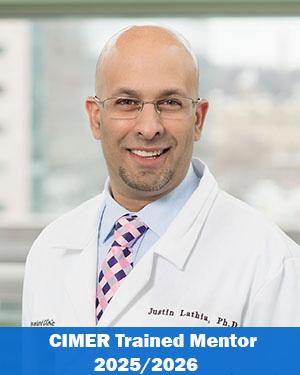Research News
02/08/2018
How Cancer Stem Cells Drive Triple-Negative Breast Cancer
Triple-negative breast cancer (TNBC) cells lack the receptors needed to bind to hormones and growth factors, meaning typical cancer treatments that target these areas are ineffective.

Hormone therapy for breast cancer blocks cancer cells from interacting with hormones such as estrogen and progesterone, which fuel the cells to grow and spread. Triple-negative breast cancer (TNBC) cells, however, lack the receptors needed to bind to these hormones and growth factors. Without such receptors, typical therapy does not work, contributing to poor survival rates for women with TNBC.
Researchers believe that an aggressive population of cancer cells, called cancer stem cells (CSCs), is at the heart of why many cancers, including TNBC, are so difficult to treat. CSCs self-replicate, rapidly grow and spread, and change their phenotype in response to the tumor environment. A new study from the labs of Justin Lathia, PhD, and Ofer Reizes, PhD, both of the Department of Cellular and Molecular Medicine, identifies a never-before described survival pathway in CSCs that may serve as a potential target for new TNBC treatment therapies.
The team studied a protein called connexin 26 (Cx26), which belongs to the connexin class of proteins. While once believed to suppress tumors, recent research suggests that connexins may actually support tumor progression and metastasis by aiding in cell-to-cell communication. The researchers compared healthy breast tissue to TNBC tissue and found that Cx26 is the most abundantly expressed connexin in diseased tissue relative to normal breast tissue. They also observed that Cx26 levels are higher in CSCs than non-CSCs and, surprisingly, that the protein is expressed inside the cell rather than on the cell surface.
The researchers determined that Cx26 expression is positively correlated with expression of another protein called NANOG. NANOG is important for transcription and contributes to CSCs' pro-cancerous ability to change phenotypes and thereby evade treatment. When Cx26 expression was inhibited, NANOG expression decreased. When Cx26 was overexpressed, NANOG expression increased. These results suggest that Cx26 and NANOG are mechanistically linked.
No previous research demonstrates a direct relationship between the two proteins, however. In search of the missing "piece" that associates them, the team conducted immunoprecipitation studies to understand Cx26's and NANOG's binding patterns. They found that both independently interact with a protein kinase called focal adhesion kinase (FAK), which plays an important role in TNBC stem cell maintenance and self-renewal. Various tests and analyses-including silencing and overexpressing each of the three proteins-revealed that Cx26, NANOG and FAK form an intracellular ternary complex and regulate the expression and activity of each other.
Additional research is needed, but this discovery suggests that inhibiting Cx26, and by extension the Cx26/NANOG/FAK complex, may be a promising new strategy for stopping or preventing TNBC CSCs from self-renewing and spreading. It may also offer a target for diagnostic testing that can help clinicians predict health outcomes and relapse-free survival for patients who exhibit Cx26/NANOG/FAK gene expression.
This study was published in Nature Communications and was supported by a co-PI (R21 CA191263). Dr. Reizes holds the Laura J. Fogarty Endowed Chair for Uterine Cancer Research.
Photo by Russell Lee.
Featured Experts
News Category
Related News
Research areas
Want To Support Ground-Breaking Research at Cleveland Clinic?
Discover how you can help Cleveland Clinic save lives and continue to lead the transformation of healthcare.
Give to Cleveland Clinic
